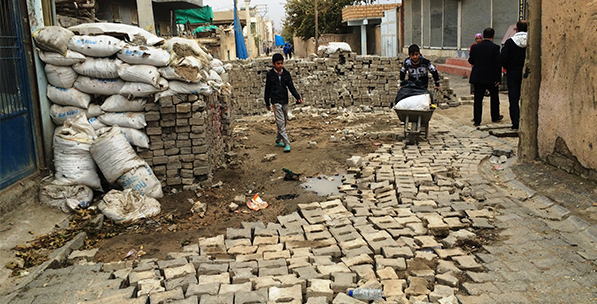In recent months, PKK militants have been trying to violently establish and enforce autonomous zones in town centers across southeastern Turkey. As part of the organization's new strategy, professional terrorists have joined hands with the Patriotic Revolutionary Youth Movement (YDG-H), the PKK's youth wing, to disrupt daily life. The authorities, in turn, are committed to ensuring public safety in targeted areas. A key symbol of the power struggle has been trenches that PKK militants have been digging in residential areas. The terrorist campaign took a heavy toll on civilians by placing innocent lives at risk and bringing the local economy to a standstill. In the end, tens of thousands of people have left the PKK's autonomous zones over several weeks.The trenches that PKK militants dig to keep security forces away from terrorist arsenals and command centers disrupt daily life and also create an existential crisis for the Kurdish nationalist movement, as destroyed homes and mosques converted into weapons storage facilities serve as striking monuments of everything of which the PKK has ever been accused. The burning down of a historical mosque in downtown Diyarbakır, for instance, went down in history as the terrorists' lack of respect for religion. Picking violence over civilian politics, the leaderships of the PKK and the Peoples' Democratic Party (HDP) has alienated a large number of Kurdish voters. The fact that a one of the chairs of the HDP chairperson had to express their disapproval of the PKK's trenches after months of silence speaks volumes about the seriousness of this existential crisis. It was, likewise, quite important that Northern Iraq's Kurdistan Regional Government President Masoud Barzani called on the militants to fill the trenches on his recent visit to Ankara.
At this point, the PKK and HDP strand within the Kurdish nationalist movement are losing ground. To be clear, the groups' weakening does not mean they are done. The PKK, an organization that has survived multiple challenges since 1984, and the PKK and the Syrian Democratic Union Party (PYD) clique, which enjoys U.S. and Russian support, will remain regional players against the backdrop of violence in Iraq and Syria.
The group has, nonetheless, been losing power in Turkey for two reasons. First, PKK militants no longer have the luxury of paying lip service to peace while stockpiling weapons in town centers. The so-called resistance in northern Syria may have helped Kurdish nationalists in the June 7 parliamentary election, but turning their back on the reconciliation process proved a fatal mistake. With PKK militants torching mosques and historical artefacts every day, the public came to realize that the PKK and HDP leaderships have derailed the disarmament talks.
Second, when the reconciliation process ended, the PKK leadership's game plan in Turkey, Iraq and Syria proved ineffective. Now, people question why PKK and PYD militants enjoy such close relations with Washington, Moscow, Tehran and Damascus at the same time. In the meantime, Kurdish nationalists sacrificed everything to pursue the dream of cantons in Turkey, which highlights a key difference between the Kurdish community's interests and the PKK leadership's priorities. Interestingly enough, PKK founder Abdullah Öcalan's brother, Osman Öcalan, recently criticized the organization for "trying to sideline Turkey at a time when the map of the Middle East is being redrawn," and argued that the PKK's return to violence was intended to hurt President Recep Tayyip Erdogan, Barzani and the PKK founder.
Simply put, the PKK faces an existential crisis of having unleashed hell on Turkey's Kurds, the organization finds it increasingly difficult to fuel nationalist sentiments by expanding its territory in Syria.
[Daily Sabah, December 16, 2015]









